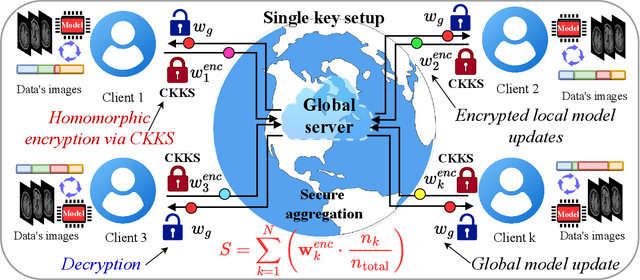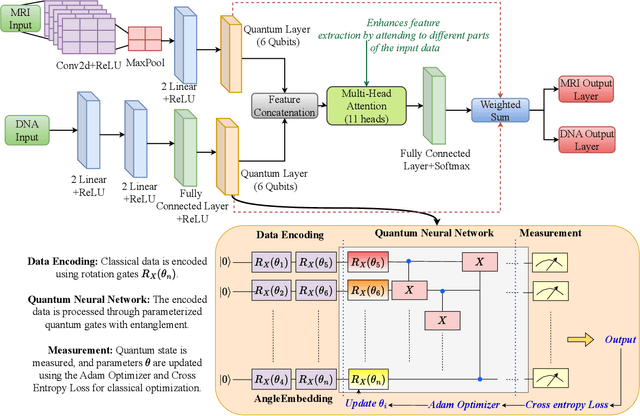David Esteban Bernal Neira
MQFL-FHE: Multimodal Quantum Federated Learning Framework with Fully Homomorphic Encryption
Nov 30, 2024



Abstract:The integration of fully homomorphic encryption (FHE) in federated learning (FL) has led to significant advances in data privacy. However, during the aggregation phase, it often results in performance degradation of the aggregated model, hindering the development of robust representational generalization. In this work, we propose a novel multimodal quantum federated learning framework that utilizes quantum computing to counteract the performance drop resulting from FHE. For the first time in FL, our framework combines a multimodal quantum mixture of experts (MQMoE) model with FHE, incorporating multimodal datasets for enriched representation and task-specific learning. Our MQMoE framework enhances performance on multimodal datasets and combined genomics and brain MRI scans, especially for underrepresented categories. Our results also demonstrate that the quantum-enhanced approach mitigates the performance degradation associated with FHE and improves classification accuracy across diverse datasets, validating the potential of quantum interventions in enhancing privacy in FL.
Federated Learning in Chemical Engineering: A Tutorial on a Framework for Privacy-Preserving Collaboration Across Distributed Data Sources
Nov 23, 2024Abstract:Federated Learning (FL) is a decentralized machine learning approach that has gained attention for its potential to enable collaborative model training across clients while protecting data privacy, making it an attractive solution for the chemical industry. This work aims to provide the chemical engineering community with an accessible introduction to the discipline. Supported by a hands-on tutorial and a comprehensive collection of examples, it explores the application of FL in tasks such as manufacturing optimization, multimodal data integration, and drug discovery while addressing the unique challenges of protecting proprietary information and managing distributed datasets. The tutorial was built using key frameworks such as $\texttt{Flower}$ and $\texttt{TensorFlow Federated}$ and was designed to provide chemical engineers with the right tools to adopt FL in their specific needs. We compare the performance of FL against centralized learning across three different datasets relevant to chemical engineering applications, demonstrating that FL will often maintain or improve classification performance, particularly for complex and heterogeneous data. We conclude with an outlook on the open challenges in federated learning to be tackled and current approaches designed to remediate and improve this framework.
 Add to Chrome
Add to Chrome Add to Firefox
Add to Firefox Add to Edge
Add to Edge